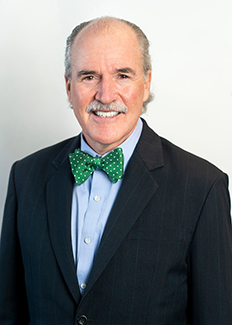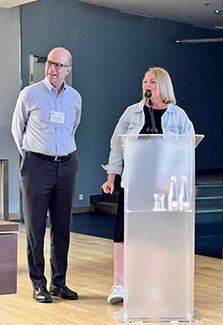Building health research resilience: Fogarty's impact in Eastern Europe and Central Asia
July 27, 2023
In June, I had the opportunity to travel to Warsaw, Poland, and meet with Fogarty grantees and trainees from Eastern Europe and Central Asia. Although there are not many Fogarty-supported programs in this region, there has been a series of grants to support training and research in several countries since the early 1990s, and former trainees have had leading roles in health research, policy, and programs.
 Read recent
blogs and articles from Acting Fogarty Director Dr. Peter Kilmarx.
Read recent
blogs and articles from Acting Fogarty Director Dr. Peter Kilmarx.
The main reason for the visit was an implementation planning meeting for a new five-year grant for the
Ukraine HIV Research Training Program. This is a continuation of a previous five-year HIV research training program with some important differences. One key change is that Dr. Kostyantyn Dumchev, a former Fogarty trainee, will be a principal investigator (PI) on the program. As scientific director of the Ukrainian Institute of Public Health Policy based in Kyiv, Dumchev will bring his depth of local knowledge to the program. The other PI on the program is Dr. Jack DeHovitz, a professor at State University of New York (SUNY) Downstate Medical Center and director of the New York State International Training and Research Program.
In the previous five years, considerable progress was made building implementation science research capacity in Ukraine, addressing challenges in access to HIV care related to an ongoing injection drug use epidemic and a poorly developed health care sector. Ukraine, like several other countries in Eastern Europe and Central Asia, is one of the few regions in the world with rising HIV rates. Another key feature of the new program will be a focus on the humanitarian crisis resulting from Russia's invasion of Ukraine. This includes issues of continuity of HIV care in the context of population displacement, supply chain disruptions, attacks on medical facilities, and widespread mental health challenges. The program links with the National Ukraine Kyiv-Mohyla Academy School of Public Health and will support training through research fellowships, a master's degree program, curriculum development, HIV research symposia, and short courses on scientific writing.
 Photo courtesy of Peter KilmarxActing Fogarty Director Peter Kilmarx (right) met with current and Fogarty former trainees in Warsaw, Poland in June 2023. Among those he met was Alyona Mazhnaia (left), a former trainee of the Fogarty-supported Ukraine HIV Research Training Program and current Fogarty Emerging Global Leader.
Photo courtesy of Peter KilmarxActing Fogarty Director Peter Kilmarx (right) met with current and Fogarty former trainees in Warsaw, Poland in June 2023. Among those he met was Alyona Mazhnaia (left), a former trainee of the Fogarty-supported Ukraine HIV Research Training Program and current Fogarty Emerging Global Leader.
It was very inspiring to hear how Dumchev and his colleagues have been able to continue supporting and tracking care and treatment for Ukrainians living with HIV infection as they were displaced by the hostilities. They have even been able to continue collecting research data on retention in care and adherence to HIV medication by their study participants. Dumchev shared that the ability to maintain contact and provide support has been important to the health and well-being of their clients and has given the study staff a sense of purpose and cohesion during very difficult times.
There are currently six Fogarty grants in Ukraine including research training on bioethics and noncommunicable diseases and research on HIV stigma and brain disorders. Five of the six principal investigators were present at the meeting. All concurred that it is important to their teams for these programs to continue despite the challenges, in part as an expression of their optimism and hopes for a future with a strong research ecosystem and evidence-based health policies.
Also present were Dr. Mamuka Djibuti from Tbilisi, Georgia, and Dr. Zhamilya Nugmanova, who joined virtually from Almaty, Kazakhstan. Both are co-principal investigators for Fogarty HIV research training programs in their countries and, together with others from the region, provided valuable guidance on HIV research training in post-Soviet academic and public health settings.
 Photo courtesy of Peter KilmarxAnna Meteliuk, (right), a former trainee of the Fogarty-supported Ukraine HIV Research Training Program, speaks at a meeting to kick-off the next phase of the program in Warsaw, Poland, in June 2023. Program co-principal investigator, Jack DeHovitz (left) also attended the meeting.
Photo courtesy of Peter KilmarxAnna Meteliuk, (right), a former trainee of the Fogarty-supported Ukraine HIV Research Training Program, speaks at a meeting to kick-off the next phase of the program in Warsaw, Poland, in June 2023. Program co-principal investigator, Jack DeHovitz (left) also attended the meeting.
DeHovitz is also a co-principal investigator on the Georgia and Kazakhstan programs. He related that he has been working in the region since 1993 with funding from Fogarty, implementing HIV research training programs initially in the Czech Republic, Poland, and Hungary, and later in the Baltic states Russia, and Armenia. Over time, these programs matured, and most of the countries “graduated" to high-income country status and were no longer eligible for Fogarty funding. Together with the current ongoing Fogarty programs in Georgia, Kazakhstan, and Ukraine, more than 110 long-term and 90 short-term trainees have been supported and in-service training has been delivered to over 6,400 health care workers. In addition, over 1,000 scientific manuscripts and books have been published, with a majority of first authors from the countries where the programs were being implemented. This has contributed significantly to the evidence basis for health care and public health in the region, and former trainees are now heads of research departments and public health programs in their countries.
Other health officials from Poland and Ukraine also joined the meeting, together with colleagues from the U.S. CDC based in Ukraine and Georgia. I was pleased to be able to meet with these exceptional leaders and learn about their accomplishments and challenges and about potential areas for future collaboration, including possibilities for a regional Ph.D. program and research on a concerning surge in antimicrobial resistance and other conflict-related health challenges. My message of strong support and encouragement to form additional partnerships and apply for more grants from Fogarty and NIH was well received. I came away with the impression that much has been accomplished in the region and there is substantial local support and interest in further expanding partnerships and research areas. The conflict, unfortunately, presents new research imperatives and opportunities. NIH-wide encouragement and full support for competitive funding applications from the region should continue.
More Information
Updated: July 27, 2023
To view Adobe PDF files,
download current, free accessible plug-ins from Adobe's website.
Related Fogarty Programs
Related Global Health Research Topics